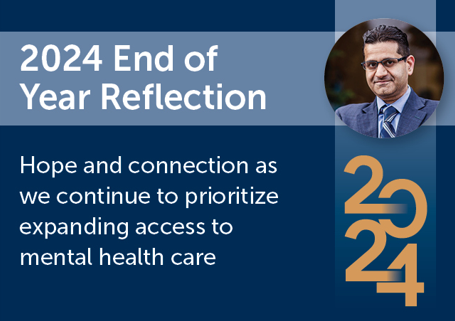When we come together to prioritize mental health, we can better support people when, where and how they need it. I am proud of what we have accomplished together, and these signs of progress give me great hope as we close out the year.
Arpan Waghray, M.D., CEO, Providence's Well Being Trust
As we reach the end of another remarkable year, I want to extend my heartfelt gratitude to each of you for your unwavering support and partnership. Together, we have made significant strides in expanding access to mental health care nationwide, ensuring that more individuals and families receive the care and support they need.
Our commitment at Providence’s Well Being Trust is to expand access to mental health care, and in the past two years, we’ve awarded nearly $10 million in grants supporting initiatives throughout the Providence seven-state footprint, as well as advancing mental health and well-being nationwide.
Our work over the past 24 months is projected to impact more than 600,000 lives, including more than 13,300 patients who received life-saving care for opioid use disorder, suicidality and depression. Furthermore, we have established 40-plus community partnerships including several school-based initiatives that are meeting the needs of our youth and teens, teachers and parents. And as part of Providence’s commitment to supporting the mental wellness of its caregivers (health care workers), the No One Cares Alone (NOCA) program provides a comprehensive menu of programs and tools to support our diverse team of caregivers at every stage of their mental wellness journey. Throughout 2024, more than 34,000 caregivers have engaged in a NOCA wellness activity.
We continue to focus on closing care gaps and expanding access based on the unique needs in our Providence communities, while sharing recommendations for change on a national scale.
Below are some examples of our impact in action.
No Wrong Door For Mental Health
Mental and physical health are inextricably linked – our care should be just as seamless. That’s why we’re integrating mental health care into routine touchpoints patients have with their primary care, pediatric, and maternal health physicians.
Below are examples:
- In Los Angeles, a new effort is increasing access to mental health support for pregnant and postpartum mothers experiencing mood and anxiety disorders and breaking down barriers of stigma with referrals from primary care and OB/GYN physicians. Since the program launched, 80% of program participants have shown a significant improvement in depression and anxiety conditions.
- In southeastern Washington and northeastern Oregon, the Kadlec Integrated Behavioral Health Expansion project is expanding access to behavioral health care by embedding licensed social workers in primary care clinics. The social workers are trained to identify and manage mental health issues through brief, solution-focused therapy sessions. In the first year, nearly 1,200 individuals have been impacted. Additional impact includes: an improvement in depression screening rates, treatment outcomes, and improved access in rural areas across southeastern Washington and northeastern Oregon
- In Alaska, we partnered with communities to grow school-based mental health services in school districts across the state, including in Anchorage and Kodiak. This initiative addresses mental health challenges through school-wide and community support, provides early interventions for at-risk students, and intensive interventions for students and their families needing additional support. This integrated, multi-tiered approach connects local communities, families, and schools to provide needed services to children and teens. School-based clinicians work closely with school staff to create a safe environment in which students, caregivers, staff, and providers build caring relationships with one another. Through this effort, more than 18,000 students and community members have been supported.
The pediatric relational health center at Covenant Children’s in Lubbock, Texas, opened fall of 2023. In just one year after its opening, the center served 12,000 unique patients and facilitated 75,000 encounters, including:
- 58,000 virtual visits
- 13,000 outpatient visits
- 2,000 partial hospitalizations 1,000 intensive outpatient visits
Providence’s Well Being Trust supported Covenant Children’s and Texas Tech Physicians Child and Adolescent Psychiatry Department to open the region’s first pediatric relational health center that is transforming pediatric care and mental health support for children and families.
The center allows Covenant Children’s to better serve the needs of the pediatric population of Lubbock County and the surrounding region, while also supporting access to telehealth services for an expansive region including West Texas/ the Panhandle Plains.
Partnering to Support Communities’ Unique Needs

- In Petaluma, California, a mobile crisis team is available 24/7 to support community members in crisis related to mental health, substance misuse and homelessness. So far, trained civilians have responded to nearly 5,500 calls for help. With empathy, de-escalation approaches, wellness checks, and connections to community-based services, they diverted hundreds of people from ambulances, hospitals, and jails into more appropriate care.
- In Thurston County, Washington, a mobile health clinic is reaching people experiencing homelessness with on-site coordinated care for mental health, substance misuse, and physical health care. The program has served nearly 850 people, and data shows a notable reduction in emergency department visits.
I invite you to learn more about our behavioral health innovation and transformation grant initiatives and the work that we’re doing to expand access to mental health care – Providence’s Well Being Trust awards $5.2 million to drive behavioral health innovation and transformation; deepen collaboration with community partners – Well Being Trust
Finding Hope and Connection in This Moment
When we come together to prioritize mental health, we can better support people when, where and how they need it. I am proud of what we have accomplished together, and these signs of progress give me great hope as we close out the year. I hope all of you are finding hope and connection in this moment as well – this is what will fuel our work together in 2025 and beyond.
Wishing you a joyful holiday season and a prosperous new year.







